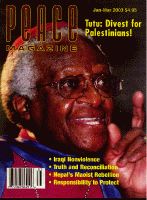
Peace Magazine Jan-Mar 2003, page 26. Some rights reserved.
Search for other articles by Jessie Forsyth here
Peter Langille. Wayne, New Jersey: Center for UN Reform Education, Publication #19
A defining notion in Dr. H. Peter Langille's recent study of UN Security capability is that of an emergency: the demand for efficient and effective response to rights violations. At this juncture in global politics, marked by the UN's struggle to stem, if not counter, military unilateralism, Langille's study holds particular importance.
Directly undermining UN influence, today's 'super' power retains its self-appointed right to define the terms of an emergency (replacing the 'evils' of regional 'Communism' with global 'Terrorism') while ignoring its obligations under international law. Langille's book delineates the need for an enforceable system of global governance that could challenge aggression through swift,multilateral intervention. Langille is most concerned with a prevailing "commitment-capacity gap" among UN Member States that translates into failure to prevent armed conflict. Focusing on the issue of accelerated deployment, Langille argues for a standing "UN Emergency Service -- a dedicated, multidimensional 'UN 911' that can address human needs, including protection, security, health and hope"
Langille concedes that "the issue of a UN standing capability remains very controversial" but calls on the UN to respect its own Charter, regarding collective security, through more than voluntary arrangements. The book is perhaps most important as an advocacy tool, a blueprint for action summarized in 24 recommendations. By breaking down complex issues, Langille encourages informed debate on the Report of the Panel on UN Peace Operations (or Brahimi Report, 2000).
He identifies the lack of political will, not lack of funds, as the greatest impediment to a permanent UN force. Yet both the Brahimi Report and a 2001 U.S. Congress proposal (U.S. H.R. 938) indicate committed interest, even in the absence of sufficient political will. The latter's objective for creating a UN Rapid Deployment Police and Security Force (PSF) is "to address the time gap, the training gap, and the political will gap with well-trained, professional military and police units that can respond to a crisis within 15 days of a Security Council Resolution".
Without detracting from Langille's well-substantiated arguments for accelerated, efficient, and globally representative peacekeeping, it is important to spend more time on the mechanics of sustainable peace building. The book's focus remains the establishment of armed forces that, even with a mandate for prevention, appear primarily invested in response. Despite his affirmation of the Panel on UN Peace Operations' emphasis on civil-military co-operation, naming peace building one of the four primary conditions for a successful operation, both Langille and the Brahimi Report understand 'preventative actions' as those that follow interventions. The book states the importance of, but lends minimal treatment to, this issue of preventative peace building, the need to protect and enhance "human needs, including...health and hope." As a caution against any 'single solution' approach to violent conflict, Langille's recommendations deserve considerable thought but should be examined with, rather than replace, diverse efforts to increase preventative capacities. Conceiving of peacekeeping and peace building as innovative processes that genuinely foster, rather than rubber stamp, the ideal of co-operation, can enable an ideological shift away from reacting to emergencies, and towards supporting diverse forms of living. Collective security, based on increased co-operation, should to be integrated into the discussion to which this book makes a valuable contribution.

Peace Magazine Jan-Mar 2003, page 26. Some rights reserved.
Search for other articles by Jessie Forsyth here